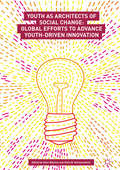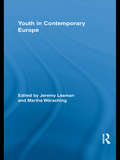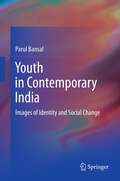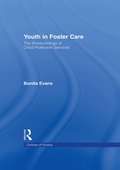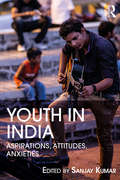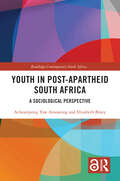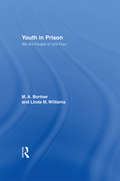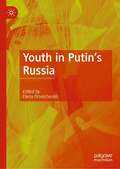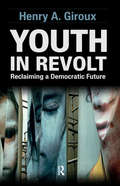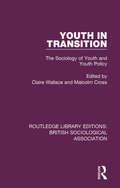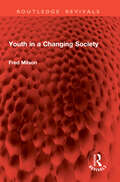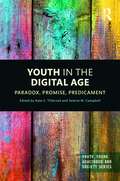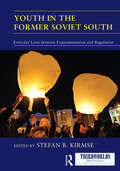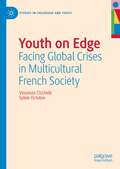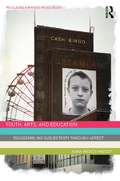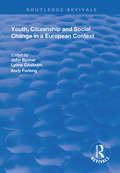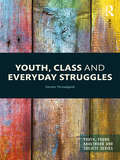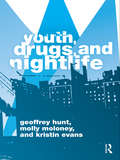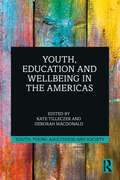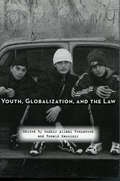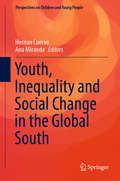- Table View
- List View
Youth as Architects of Social Change
by Sheri Bastien Halla B. HolmarsdottirThis edited collection outlines the issues central to youth engagement in research and social innovation. Youth-driven innovation for social change is increasingly recognized as holding potential for the development of sustainable strategies to tackle some of the most pressing global challenges of our time. The contributors provide additional knowledge concerning what actually constitutes an enabling environment, as well as the most effective approaches for engaging youth as architects of change. While sensitive to the need for contextual appropriateness, the volume contributes to the development of shared understandings and frameworks for engaging and spurring youth-driven innovation for social change worldwide. Youth-Driven Social Innovation showcases examples of youth engagement in frugal and reverse innovation worldwide, alongside examples which demonstrate the tremendous potential of South-South learning, but also learning and youth innovation in the Global North. It will be of interest to students and scholars across a range of disciplines including education, sociology, anthropology, public health, and politics.
Youth in Contemporary Europe (Routledge Advances in Sociology)
by Jeremy LeamanThis book examines the everyday living conditions experienced and also shaped by young people in Europe. Contributors reflect on the current context of economic, social and political change affecting youth in the critical transition from dependence to independence. The volume provides the reader with a multi-dimensional and interdisciplinary view of youth cultures, drawn from a variety of recent research throughout the continent.
Youth in Contemporary India
by Parul BansalThis book endeavors to be a study of identity in Indian urban youth. It is concerned with understanding the psychological themes of conformity, rebellion, individuation, relatedness, initiative and ideological values which pervade youths' search for identity within the Indian cultural milieu, specifically the Indian family. In its essence, the book attempts to explore how in contemporary India the emerging sense of individuality in youth is seeking its own balance of relationality with parental figures and cohesion with social order. The research questions are addressed to two groups of young men and women in the age group of 20-29 years-Youth in Corporate sector and Youth in Non Profit sector. Methodologically, the study is a psychoanalytically informed, process oriented, context sensitive work that proceeds via narrations, conversations and in-depth life stories of young men and women. Overall, the text reflects on the nature of inter-generational continuity and shifts in India.
Youth in Foster Care: The Shortcomings of Child Protection Services (Children of Poverty)
by Bonita EvansFirst published in 1998. Routledge is an imprint of Taylor & Francis, an informa company.
Youth in India: Aspirations, Attitudes, Anxieties
by Sanjay KumarThis book explores the attitudes, anxieties and aspirations of India’s burgeoning young population in a globalised world. Drawing upon time-series survey data of the Indian youth aged between 15 and 34 years across 19 Indian states, it provides key insights into a range of themes along with an overview of the changing trends and patterns of their behaviour. The volume examines the job preferences of the Indian youth, their career priorities and opinions on reservations in employment and education sectors. It measures their degree of political participation and studies their attitude regarding political issues. It looks at aspects relating to their social and cultural contexts, preferences and practices, including lifestyle choices, consumption habits and social customs such as marriage, as they negotiate between tradition and modernity. Further, it discusses the anxieties and insecurities that the youth face, their mental health and their experiences of social discrimination. The essays here offer an understanding of a critical demographic and shed light on the challenges and opportunities that the Indian youth confront today. Lucid, accessible and empirically grounded, this volume will be useful to scholars and researchers of sociology, political sociology, political studies, youth psychology and anthropology as well as policymakers, journalists and the interested general reader.
Youth in Post-Apartheid South Africa: A Sociological Perspective (ISSN)
by Acheampong Yaw Amoateng Elizabeth BineyThis book investigates the life experiences of youth in South Africa, considering whether contemporary youth have benefitted from the socioeconomic reconstruction of post-apartheid society.Student protests against apartheid drove transformative change in South Africa, and the subsequent new constitution promised positive change for the nation’s youth across a range of sectors. Adopting a sociological perspective, this book uses primary and secondary data sources to illustrate the myriad ways post-apartheid socioeconomic developments have impacted the life experiences of the country’s youth across areas including health, education, family life, economic activity, technology, substance use, and politics. The book considers the historical legacy of colonialism, racism and immigration in shaping the context in which youth experiences in the country have evolved. The book argues that in 1976 South Africa’s youth became the conscience of the nation when they brought the apartheid regime to its knees during the Soweto uprising. What happens to them now will continue to define the nation’s future.This book will be of interest to researchers across the social sciences, most especially in the fields of Sociology, Demography, Development Studies, and Psychology.
Youth in Prison: We the People of Unit Four
by Linda Williams M. A. BortnerBased on two years of intensive research in a juvenile prison, this study tells the story of youths in a "model program," created after a class action lawsuit for inhumane and illegal practices. It captures their lives inside and outside of prison: from drugs, gangs and criminal behaviour to the realities of families, schools and neighbourhoods. Drawing on experience that encompasses 20 years of juvenile justice research and policy analysis, the authors scrutinize the prison's attempts to combine accountability and treatment for youths with protection for the public, situating these within the larger social and political context.
Youth in Putin's Russia
by Elena OmelchenkoThis edited volume sheds light on the lives of young people in various central and peripheral regions of Russia, including youth belonging to different ethnic and religious groups and who have differing views on contemporary politics. While the literature continues to grow regarding the inclusion of youth in global contexts, the specific cultural, political, and economic circumstances of being young in Russia make the Russian case unique. Chapter authors focus on four key aspects that characterize the youth experience in contemporary Russia: cultural practices and value affiliations, citizenship and patriotism, ethnic and religious diversity, and the labor market. This collection will appeal to readers interested in contemporary life in Russia and looking for the latest empirical material on youth identities and cultures, as well as those looking to learn about the critical viewpoint of local academics regarding the ongoing processes in contemporary Russian society.
Youth in Revolt: Reclaiming a Democratic Future (Critical Interventions)
by Henry A. GirouxRecently, American youth have demonstrated en masse about a variety of issues ranging from economic injustice and massive inequality to drastic cuts in education and public services. Youth in Revolt chronicles the escalating backlash against dissent and peaceful protest while exposing a lack of governmental concern for society's most vulnerable populations. Henry Giroux carefully documents a wide range of phenomena, from pervasive violent imagery in our popular culture to educational racism, censorship, and the growing economic inequality we face. He challenges the reader to consider the hope for democratic renewal embodied by Occupy Wall Street and other emerging movements. Encouraging a capacity for critical thought, compassion, and informed judgment, Giroux's analysis allows us to rethink the very nature of what democracy means and what it might look like in the United States and beyond.
Youth in Transition: Housing, Employment, Social Policies and Families in France and Spain (Routledge Revivals)
by Teresa Jurado GuerreroThis title was first published in 2002: In recent years there has been a trend among young people across Europe towards remaining longer in their parental homes. Many reasons have been suggested for this change in demographic patterns, but Teresa Jurado Guerrero’s study of France and Spain represents the first in-depth cross-national analysis of this important social and economic issue. The book provides systematic comparisons of living arrangements at cross-national, cross-regional and individual levels and examines the results of two large-scale national surveys. It investigates the relevance of young people’s employment situations, social policies related to youth, national and regional housing markets and family norms, and identifies policy measures which would encourage early home-leaving and family formation. The book exposes the existence and effects of different national and individual strategies surrounding the process of becoming socially independent, and offers unique insights into an issue of key relevance for parents, young people, researchers and policy makers.
Youth in Transition: The Sociology of Youth and Youth Policy (Routledge Library Editions: British Sociological Association #6)
by Malcolm Cross Claire WallaceOriginally published in 1990, Youth in Transition addresses the issue of large-scale policy intervention, related to problems of employment in Britain’s youth. The book reflects the changes within sociology from studying youth as self-contained instigators of change, to examining the role they have come to play as the target of official, rather than popular or media attention. Changes in youth experience are affecting family relations and dependence or creating homelessness, regional economic disparities, demographic changes and training and employment opportunities, present a new model of youth and re-define its status. The book brings together original work in the field of youth and youth policy in the ‘80s and ‘90s.
Youth in a Changing Society (Routledge Revivals)
by Fred MilsonFirst Published in 1972, Youth in a Changing Society examines the ‘youth problem’, dealing with questions of alienation, drugs, juvenile crime, protest, the social cultural position of young people in Britain, and suggests a new way of thinking which should promote greater understanding of the relationships between the generations. The author, who is a leading authority in the area of youth and their activities, proposes ways in which social and educational agencies may put this understanding to practical use by creating a constructive relationship between the generations and between youth and our society.Dr Milson uses illustrative material from British and international sources and his account should be of interest to a wide audience.
Youth in the Digital Age: Paradox, Promise, Predicament (Youth, Young Adulthood and Society)
by Kate C Tilleczek Valerie M CampbellYoung people spend a significant amount of time with technology, particularly digital and social media. How do they experience and cope with the many influences of digital media in their lives? What are the main challenges and opportunities they navigate in living online? Youth in the Digital Age provides answers from a decidedly interdisciplinary perspective, beginning in a framework steeped in context; biography; and societal influences on young people, who now make up 25% of the earth’s population. Placing these perspectives alongside those of current scholars and commentators to help analyse what young people are up against in navigating the digital age, the volume also draws on data from a five-year research project (Digital Media and Young Lives). Topics explored include well-being, privacy, control, surveillance, digital capital, and social relationships. Based on unique and emergent research from Canada, Scotland, and Australia, Youth in the Digital Age will appeal to post-secondary educators and scholars interested in fields such as youth studies, education, media studies, mental health, and technology.
Youth in the Former Soviet South: Everyday Lives between Experimentation and Regulation (ISSN)
by Stefan B. KirmseThis book offers the first comprehensive analysis of youth, in all its diversity, in Muslim Central Asia and the Caucasus. It brings together a range of academic perspectives, including media studies, Islamic studies, the sociology of youth, and social anthropology. While most discussions of youth in the former Soviet South frame the younger generation as victims of crisis, as targets of state policy, or as holy warriors, this book maps out the complexity and variance of everyday lives under post-Soviet conditions. Youth is not a clear-cut, predictable life stage. Yet, across the region, young people’s lives show forms of experimentation and regulation. Male and female youth explore new opportunities not only in the buzzing space of the city, but also in the more closely monitored neighbourhood of their family homes. At the same time, they are constrained by communal expectations, ethnic affiliation, urban or rural background and by gender and sexuality. While young people are more dependent and monitored than many others, they are also more eager to explore and challenge. In many ways, they stand at the cutting edge of globalization and post-Soviet change, and thus they offer innovative perspectives on these processes. This book was published as a special issue of Central Asian Survey.
Youth in the Roman Empire
by Christian Laes Johan StrubbeModern society has a negative view of youth as a period of storm and stress, but at the same time cherishes the idea of eternal youth. How does this compare with ancient Roman society? Did a phase of youth exist there with its own characteristics? How was youth appreciated? This book studies the lives and the image of youngsters (around 15-25 years of age) in the Latin West and the Greek East in the Roman period. Boys and girls of all social classes come to the fore; their lives, public and private, are sketched with the help of a range of textual and documentary sources, while the authors also employ the results of recent neuropsychological research. The result is a highly readable and wide-ranging account of how the crucial transition between childhood and adulthood operated in the Roman world.
Youth on Edge: Facing Global Crises in Multicultural French Society (Studies in Childhood and Youth)
by Vincenzo Cicchelli Sylvie OctobreThis book explores disrupted youth cohesion in France within the context of multiple ongoing global economic, migratory, social, political, and security-related crises. While these trends can be observed in numerous Western societies, France provides a unique case study of various anti-cosmopolitan and anti-Enlightenment movements shaping youth conditions and reconfiguring relationships between the individual, the group, and society. The authors undertook in-depth interviews with French young people between the ages of 18 to 30 years old to inquire into how they experience "vivre ensemble" (living together) in a time of rising economic inequalities and multicultural tensions. Through these findings, they invite decision-makers, politicians, educators, and parents to propose a renewed narrative of social cohesion for youth who are not disillusioned, but deeply on edge.
Youth, Arts, and Education: Reassembling Subjectivity through Affect (Routledge Advances in Sociology)
by Anna Hickey-MoodyHow are the arts important in young people’s lives? Youth, Arts and Education offers a groundbreaking theory of arts education. Anna Hickey-Moody explores how the arts are ways of belonging, resisting, being governed and being heard. Through examples from the United Kingdom and Australia, Anna Hickey-Moody shows the cultural significance of the kinds of learning that occur in and through arts. Drawing on the thought of Gilles Deleuze, she develops the theory of affective pedagogy, which explains the process of learning that happens through aesthetics. Bridging divides between critical pedagogical theory, youth studies and arts education scholarship, this book: Explains the cultural significance of the kinds of learning that occur in and through arts Advances a theory of aesthetic citizenship created by youth arts Demonstrates ways in which arts practices are forms popular and public pedagogy Critiques popular ideas that art can be used to fix problems in the lives of youth at risk Youth, Arts and Education is the first post-critical theory of arts education. It will be of interest to students and scholars across the social sciences and humanities, in particular in the sociology of education, arts education, youth studies, sociology of the arts and cultural studies.
Youth, Citizenship and Social Change in a European Context (Routledge Revivals)
by Lynne Chisholm Andy Furlong John BynnerPublished in 1997, this text is built around themes agreed upon for a conference which aimed to set the agenda for youth research over the next decade. These themes are: the shaping of trajectories and biographies - individualization, agency, structure; vulnerable groups excluded and included youth, polarization, marginalization; social construction of identity - identity, culture, gender, ethnicity; political and social participation and citizenship. The book brings together the work of British and Continental researchers.
Youth, Class and Everyday Struggles (Youth, Young Adulthood and Society)
by Steven ThreadgoldThe concept of everyday struggles can enliven our understanding of the lives of young people and how social class is made and remade. This book invokes a Bourdieusian spirit to think about the ways young people are pushed and pulled by the normative demands directed at them from an early age, whilst they reflexively understand that allegedly available incentives for making the ‘right’ choices and working hard – financial and familial security, social status and job satisfaction – are a declining prospect. In Youth, Class and Everyday Struggles, the figures of those classed as 'hipsters' and 'bogans' are used to analyse how representation works to form a symbolic and moral economy that produces and polices fuzzy class boundaries. Further to this, the practices of young people around DIY cultures are analysed to illustrate struggles to create a satisfying and meaningful existence while negotiating between study, work and creative passions. By thinking through different modalities of struggles, which revolve around meaning making and identity, creativity and authenticity, Threadgold brings Bourdieu’s sociological practice together with theories of affect, emotion, morals and values to broaden our understanding of how young people make choices, adapt, strategise, succeed, fail and make do. Youth, Class and Everyday Struggles will appeal to undergraduate and postgraduate students, as well as postdoctoral researchers, of fields including: Youth Studies, Class and Inequality, Work and Careers, Subcultures, Media and Creative Industries, Social Theory and Bourdieusian Theory.
Youth, Crime and Justice
by Cyndi BanksYouth, Crime and Justice takes a critical issues approach to analyzing the current debates and issues in juvenile delinquency. It encourages readers to adopt an analytical understanding encompassing not only juvenile crime, but also the broader context within which the conditions of juvenile criminality occur. Students are invited to explore the connections between social, political, economic and cultural conditions and juvenile crime. This book engages with the key topics in the debate about juvenile justice and delinquency: juvenile institutions delinquency theories gender and race youth and moral panic restorative justice youth culture and delinquency. It clearly examines all the important comparative and transnational research studies for each topic. Throughout, appropriate qualitative studies are used to provide context and explain the theories in practice, conveying a powerful sense of the experience of juvenile justice. This accessible and innovative textbook will be an indispensable resource for senior undergraduates and postgraduates in criminology, criminal justice and sociology.
Youth, Drugs, and Nightlife
by Geoffrey Hunt Molly Moloney Kristin EvansYouth, Drugs, and Night Life examines the relationships between the electronic dance scene and drug use for young ravers and clubbers today. Based on over 300 interviews with ravers, DJ’s and promoters, Hunt, Moloney, and Evans examine the different social groupings that make up the scene. The authors explore the accomplishment of gender, sexuality, and Asian American ethnic identity and critically analyze the negotiation of risk and pleasure within the world of raves and dance clubs. We learn about young ravers and clubbers’ frustrations with recent attempts to control clubs and raves and their skepticism about official pronouncements on the dangers of ecstasy and other drugs, in this book that pivots between the local, the national, and the global in its approach.
Youth, Education and Wellbeing in the Americas (Youth, Young Adulthood and Society)
by Kate C. Tilleczek Deborah MacDonaldThis book explores ways in which education supports or negates the wellbeing and rights of young people in/from the Americas. It shows how young people diagnose problems and propose important new directions for education. A collective chronicle from researchers working alongside young people in Chile, Dominican Republic, Guatemala, Honduras, Trinidad & Tobago, Jamaica, and the Caribbean and Latin American diaspora in Canada, the authors embrace the work in terms of justice: intergenerational, racial, cultural, and ecological with/by/for various groups of young people. This book delves into the wide gap between the expressed rights of young people in the United Nations Convention on the Rights of the Child and the ways in which education operates. In so doing it examines the entrenched colonial legacies which persist including systemic racism, flabby curriculum, hyper-surveillance and broken promises for care and human relationships needed to support youth. The resourceful young people shown here—who identify as Latin American, Black, Indigenous and/or diasporic—are diagnosing and negotiating these injustices in revolutionary moves for education. Teachers, parents, communities and youth themselves could learn from these critical, transformative and anticolonial youthful pedagogies for being with education. This book will appeal to scholars, students, policymakers and practitioners in the areas of youth studies, education, social justice, sociology, human rights, wellbeing and social work.
Youth, Globalization, and the Law
by Ronald Kassimir Sudhir VenkateshThis book addresses the impact of globalization on the lives of youth, focusing on the role of legal institutions and discourses. As practices and ideas travel the globe--such as the promotion and transmission of zero tolerance and retributive justice programs, the near ubiquitous acceptance of the UN Convention on the Rights of the Child, and the transnational migration of street gangs--the legal arena is being transformed. The essays in this book offer case studies and in-depth analyses, spanning diverse settings including courts and prisons, inner-city streets, international human rights initiatives, newspaper offices, local youth organizations, and the United Nations. Drawing on everyday social practices, each chapter adds clarity to our current understanding of the ways in which ideas and practices in different parts of the world can affect youth in one particular locale.
Youth, Inequality and Social Change in the Global South (Perspectives on Children and Young People #6)
by Hernan Cuervo Ana MirandaThis book gathers international and interdisciplinary work on youth studies from the Global South, exploring issues such as continuity and change in youth transitions from education to work; contemporary debates on the impact of mobility, marginalization and violence on young lives; how digital technologies shape youth experiences; and how different institutions, cultures and structures generate a diversity of experiences of what it means to be young. The book is divided into four broad thematic sections: (a) Education, work and social structure; (b) Identity and belonging; (c) Place, mobilities and marginalization; and (d) Power, social conflict and new forms of political participation of youth.
Youth, Multiculturalism and Community Cohesion
by Paul ThomasSince the 2001 'race riots' in the north of England, and the 7/7 London bombings, Britain has appeared to reject multiculturalism. It has instead prioritized a new policy of 'Community Cohesion' that calls for a focus on common needs and shared British identity, rather than on ethnic and religious differences. This has proved a controversial agenda, apparently downplaying the reality of racism and ethnic diversity, and leading to one critic calling it 'the death of multiculturalism'. Little evidence has emerged so far on what Community Cohesion actually represents, but this book addresses that deficit by drawing on empirical research around work with young people to analyse the meaning and practice of British Community Cohesion policies, youth identities in racially-tense areas, and government's attempts to 'prevent violent extremism' amongst young Muslims. It concludes that Community Cohesion is a new phase of multiculturalism, not its death.
